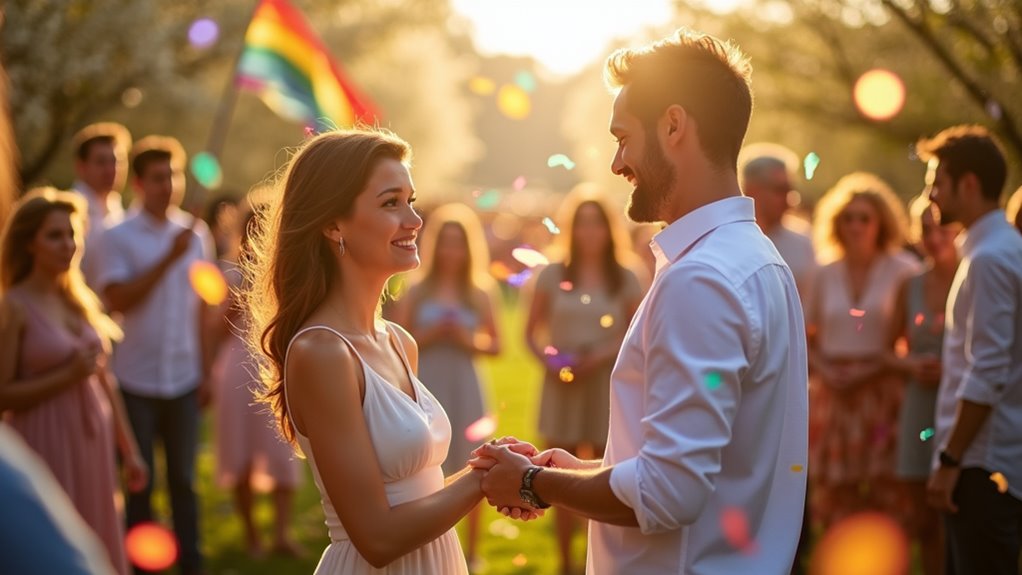Marriage equality is the belief that all couples deserve the same legal recognition of marriage, regardless of sexual orientation or gender identity. In many faith traditions, views on marriage equality vary, with some communities embracing inclusive interpretations of love, covenant, and dignity, while others uphold traditional teachings shaped by scripture and long-held customs. As debates continue, marriage equality invites spiritual reflection on compassion, justice, and the sacred value of committed relationships, encouraging people of faith to balance religious convictions with respect for human rights and the common good.
The definition of marriage equality
Marriage equality is the belief that all couples deserve the same rights and recognition, regardless of sexual orientation or gender identity.
In many faith communities, marriage equality is viewed through the lens of compassion, dignity, and the spiritual value of loving commitment.
Historical context of marriage rights
Understanding marriage equality requires looking at the historical context of marriage rights through the lens of religion and spirituality.
For centuries, marriage rights were shaped by religious traditions and cultural norms, often limiting unions to certain genders, faiths, or social classes. As spiritual perspectives evolved and interfaith dialogue grew, many communities began to reconsider what fairness, compassion, and inclusion mean in the context of marriage rights.
This shift helped redefine marriage equality as a moral and spiritual issue, not just a legal one. Today, the ongoing conversation about marriage rights bridges law, faith, and human dignity, showing how marriage equality emerged from changing beliefs about justice, love, and the sacred bonds that connect people.
Legal milestones in marriage equality
Legal milestones in marriage equality have shaped not only civil rights but also conversations around faith and inclusion.
As marriage equality expanded, many religious communities reexamined teachings, embraced compassion, and explored how love, dignity, and covenant fit within spiritual life.
These legal milestones in marriage equality encouraged interfaith dialogue, inspired clergy to bless same-sex unions, and prompted believers to seek harmony between conscience and law.
Today, legal milestones in marriage equality continue to guide people of faith toward deeper understanding, affirming that spiritual values, justice, mercy, and love, can coexist with equal rights for all.
The role of activism and advocacy
Activism and advocacy have been vital in the movement for marriage equality, especially when viewed through the lens of religion and spirituality. Faith-based activists, interfaith coalitions, and spiritual leaders helped bridge divides by showing how love, justice, and compassion align with many religious teachings. This spiritually rooted activism raised awareness, influenced public opinion, and supported legal change.
Grassroots movements and policy advocacy worked alongside faith communities to host dialogues, share personal testimonies, and build inclusive coalitions. Intersectional activism ensured that people of diverse religious and spiritual backgrounds were heard, highlighting how marriage equality can reflect core values like dignity and neighborly love.
Through community outreach and legislative lobbying, advocates strategically promoted legal reforms while honoring religious freedom and spiritual authenticity.
In this journey, religion and spirituality served as powerful motivators for social justice. By centering compassion, many spiritual leaders endorsed equal marriage rights, demonstrating that faith can evolve toward inclusivity.
This blend of activism, religion and spirituality helped transform hearts, shape policy, and advance marriage equality in a way that respects both conscience and community.
Impact of marriage equality on society
Marriage equality and religion often intersect in meaningful ways. How has marriage equality reshaped societal norms and institutions?
Marriage equality has strengthened social cohesion and cultural acceptance by providing legal recognition while encouraging faith communities to reflect on compassion, dignity, and love. Many people of faith see marriage equality as aligned with spiritual values of justice and care for one another, leading to deeper dialogue and understanding across traditions.
In families and congregations, marriage equality supports healthier relationships, emotional well-being, and a sense of belonging. It invites religious leaders and spiritual seekers to nurture inclusive pastoral care, strengthen community bonds, and model empathy.
Economically and civically, marriage equality also promotes stability, encourages participation in community life, and advances social justice. As society evolves, marriage equality and religion can work together to build a more inclusive, ethical, and spiritually grounded future.
Differences between civil unions and marriage
Understanding the differences between civil unions and marriage is essential for anyone exploring faith, family, and community.
While marriage equality has expanded spiritual belonging in many traditions, the differences between civil unions and marriage remain significant in both legal and religious contexts.
Civil unions often offer limited legal recognition compared to marriage licenses, which can impact family rights, inheritance, healthcare decisions, and community standing.
These gaps also shape social acceptance, especially within religious communities that may view marriage as a sacred covenant.
Because state regulations vary, the differences between civil unions and marriage can influence how each status is perceived, practiced, and honored in both spiritual life and everyday society.
Global perspectives on marriage equality
In many places, religion and spirituality play a central role in shaping public debates and legal decisions. Different faith traditions interpret marriage equality through their own teachings, which can either support inclusion or call for caution.
At the same time, spiritual communities are increasingly engaging in dialogue, seeking compassionate paths that honor both belief and human dignity.
International laws influence, but do not control, national policies on marriage equality. Local religious leaders, interfaith groups, and spiritual activists often drive change by encouraging empathy, education, and respectful conversation. These efforts help shift public opinion and inspire lawmakers to consider reforms.
While disparities remain, growing recognition of marriage equality reflects evolving global perspectives. The interaction of legal frameworks, cultural values, and faith-based viewpoints shows how religion and spirituality can guide societies toward understanding and fairness.
As more communities reflect on the spiritual meaning of love and commitment, support for marriage equality continues to expand.
Challenges faced by the marriage equality movement
The marriage equality movement continues to face challenges rooted in religion, spirituality, and cultural traditions. While support is growing worldwide, religious objections and spiritual misconceptions often fuel social stigma, legal opposition, and political resistance.
The marriage equality movement must also navigate intersectional issues and economic disparities, which can limit access to resources and representation.
Many faith communities are reexamining beliefs, with some embracing inclusive interpretations of spirituality that affirm love, dignity, and equal rights.
Still, overcoming deeply held biases remains vital. Grassroots efforts, interfaith dialogues, and education are helping shift public perception, showing that the marriage equality movement can coexist with faith and moral values.
How marriage equality affects families
Marriage equality and families are deeply connected to many people’s journeys in faith and spirituality. When communities embrace marriage equality, it supports families by honoring love, commitment, and the sacred bonds many religions value. This recognition strengthens legal protections for parents and children, encourages emotional wellbeing through acceptance, and allows couples to live their spiritual values openly.
In practice, marriage equality helps secure parenting rights, clarifies responsibilities, and creates stable homes where children can flourish. Many faith-led families find that inclusive policies reduce stigma and deepen compassion within congregations, strengthening sibling and extended family relationships.
Economic benefits of marriage equality
Marriage equality brings real benefits not only to families and spiritual communities but also to the broader economy. In many faith-based settings, marriage equality supports stability, compassion, and shared responsibility, values that align with spiritual teachings about love and justice.
Economically, marriage equality boosts consumer spending, strengthens the housing market, and encourages long-term financial planning. Couples gain access to tax benefits, healthcare coverage, and retirement options that improve financial security and help build generational wealth.
Future directions for marriage equality rights
As societal attitudes continue to evolve, the pursuit of marriage equality rights must adapt to address emerging legal, cultural, and spiritual questions. In many faith communities, people are reexamining sacred texts, traditions, and pastoral care to better support marriage equality rights while honoring core spiritual values like compassion, dignity, and love.
Interfaith dialogues, inclusive congregations, and spiritual counseling can help bridge differences and promote marriage equality rights in ways that respect religious freedom and diverse beliefs.
Future progress will rely on ongoing advocacy, thoughtful legislation, and open-hearted conversations within religious and spiritual groups. By uplifting intersectional voices communities can cultivate understanding, reduce stigma, and foster belonging.
As norms change, faith-led initiatives, education, and inclusive rituals can guide global progress toward dignity, inclusivity, and legal recognition for all couples.
Conclusion
Marriage equality is about fairness, love, and dignity for every couple, and it resonates deeply with many faith traditions that teach compassion and justice. For people exploring religion and spirituality, marriage equality invites reflection on how sacred values, like love, commitment, and community, can guide inclusive practices. Around the world, faith leaders and spiritual communities are engaging in thoughtful dialogue, recognizing that marriage equality strengthens families, promotes social harmony, and honors the inherent worth of every person. Embracing marriage equality does not diminish religious belief; it encourages believers to live out core spiritual principles with empathy and respect. As conversations continue, many find that supporting marriage equality aligns with a spiritual path rooted in mercy, courage, and the common good.
Amanda Torati is a linguist and postgraduate researcher dedicated to the study of interfaith dialogue and cultural expression. With an academic background in languages, she specializes in analyzing spiritual texts and universal values to bridge the gap between ancient traditions and modern reflection. At ABPray, Amanda combines her passion for research with a mindful approach, ensuring that every article promotes harmony, respect, and deep spiritual insight for seekers of all backgrounds.






